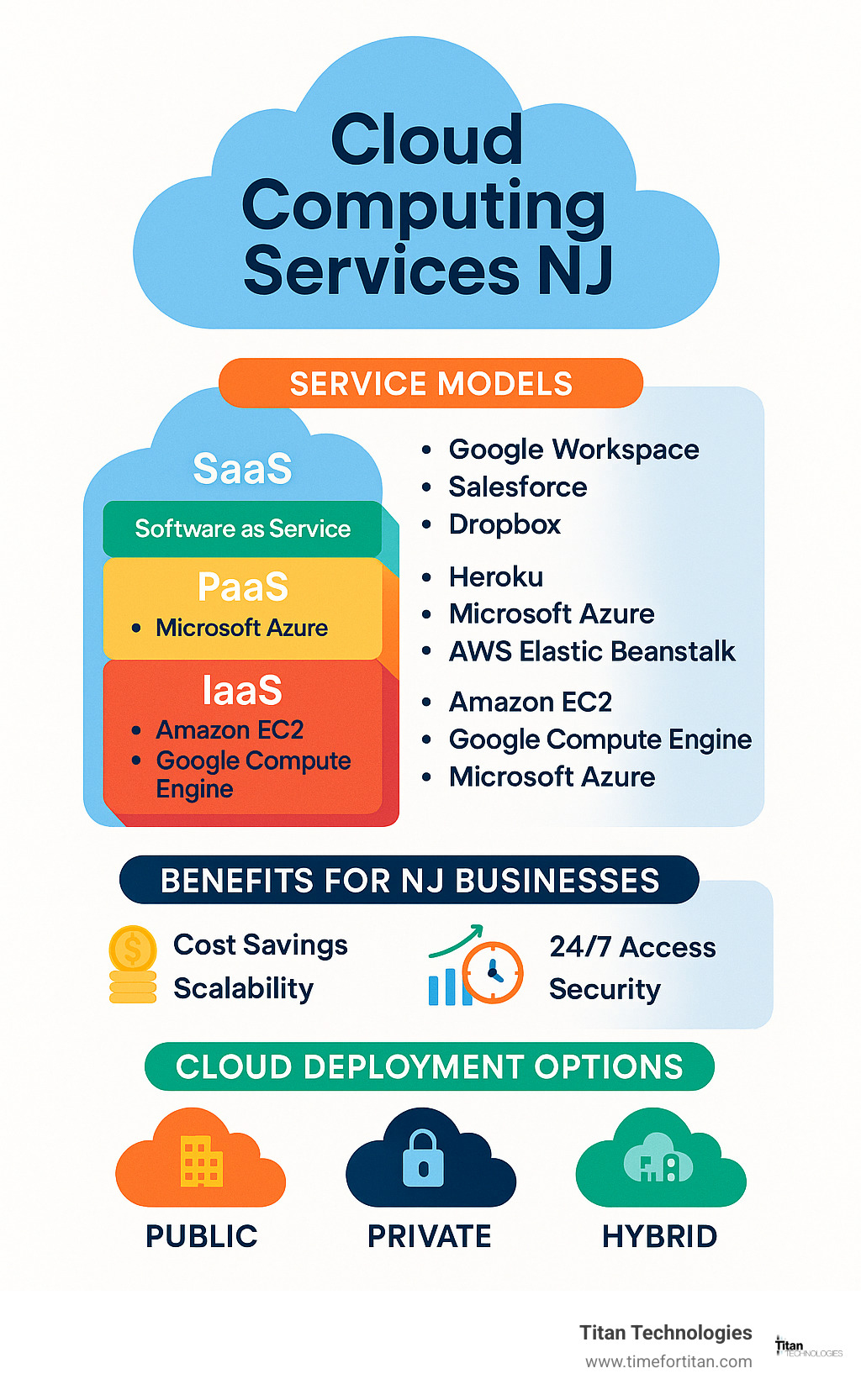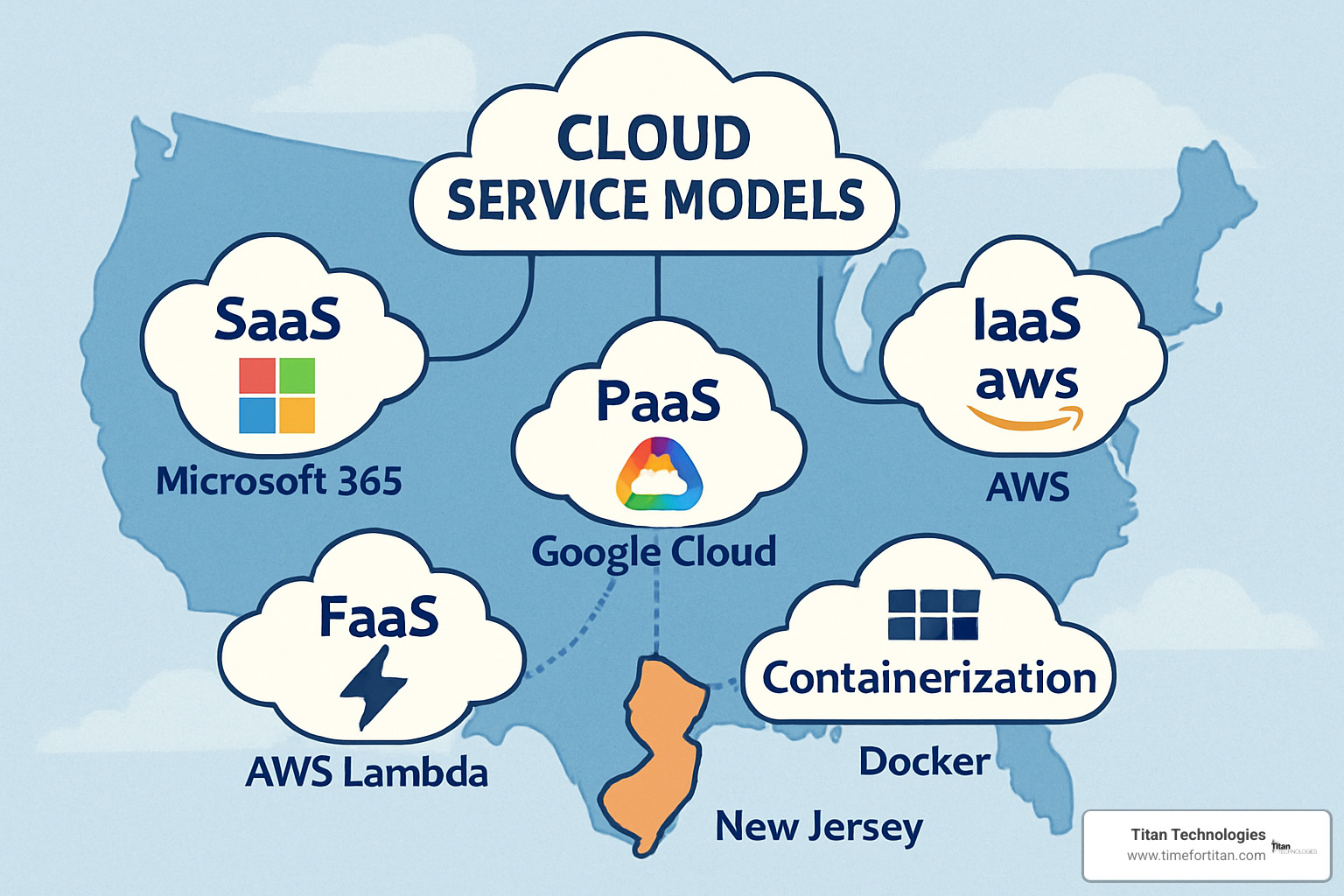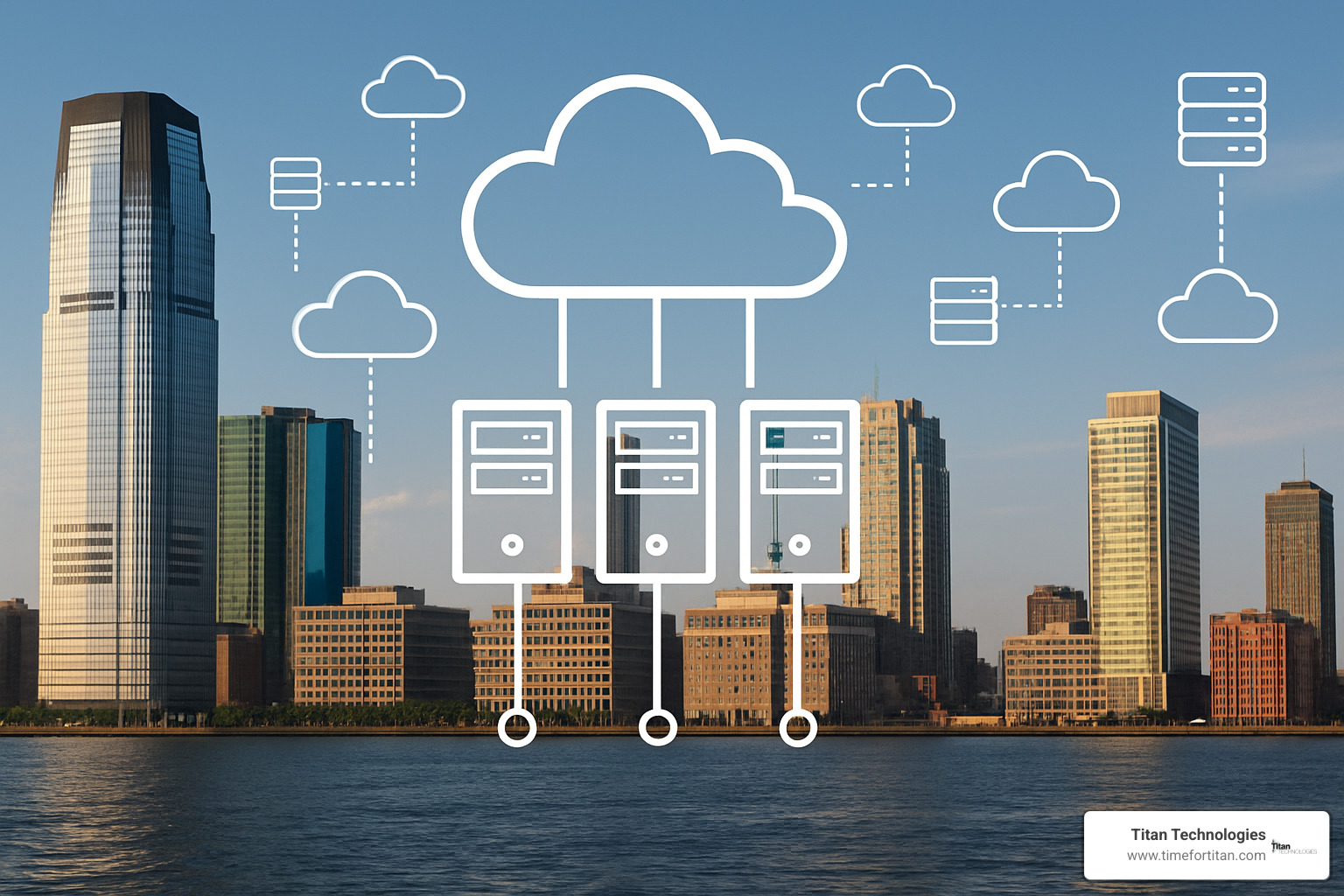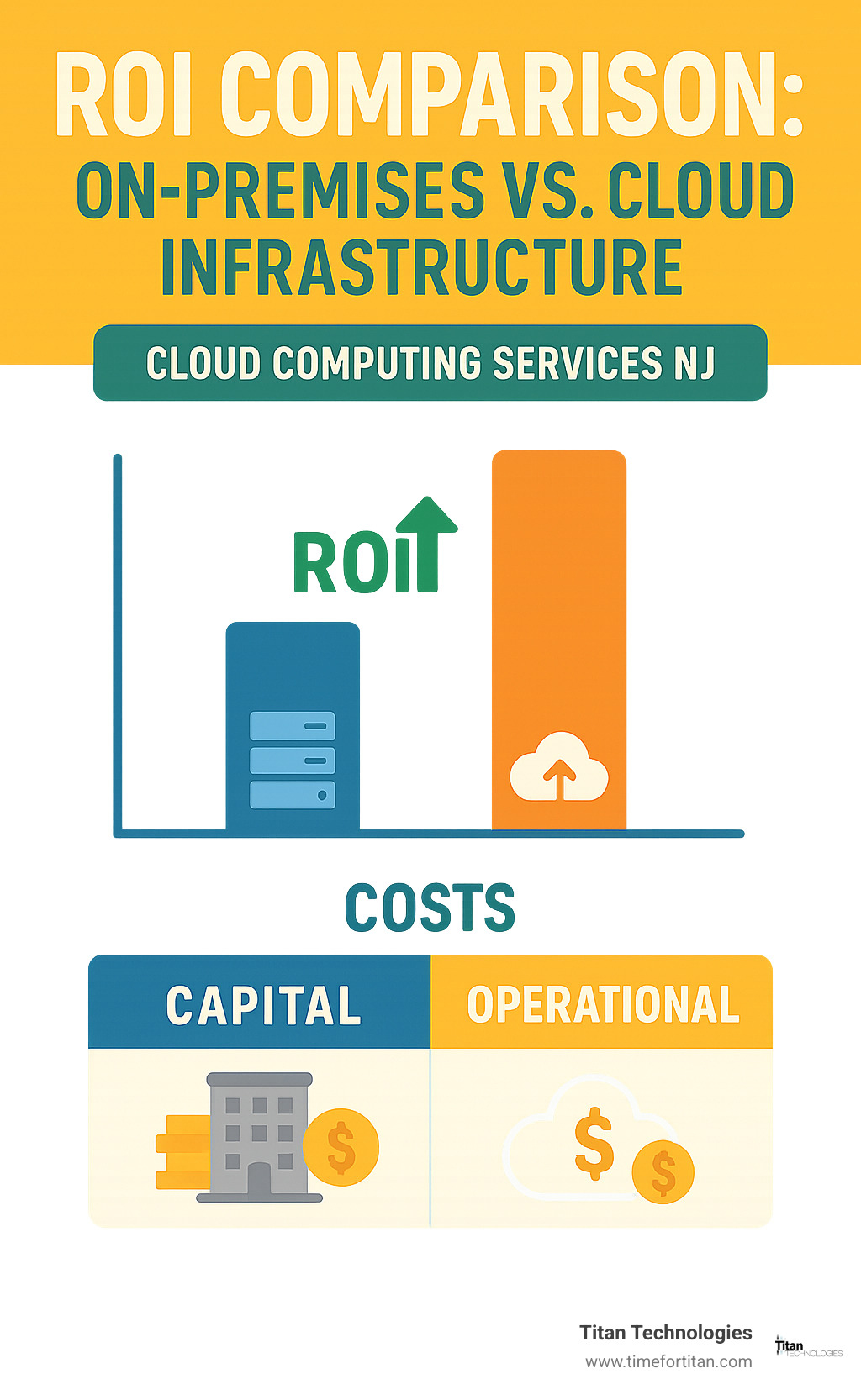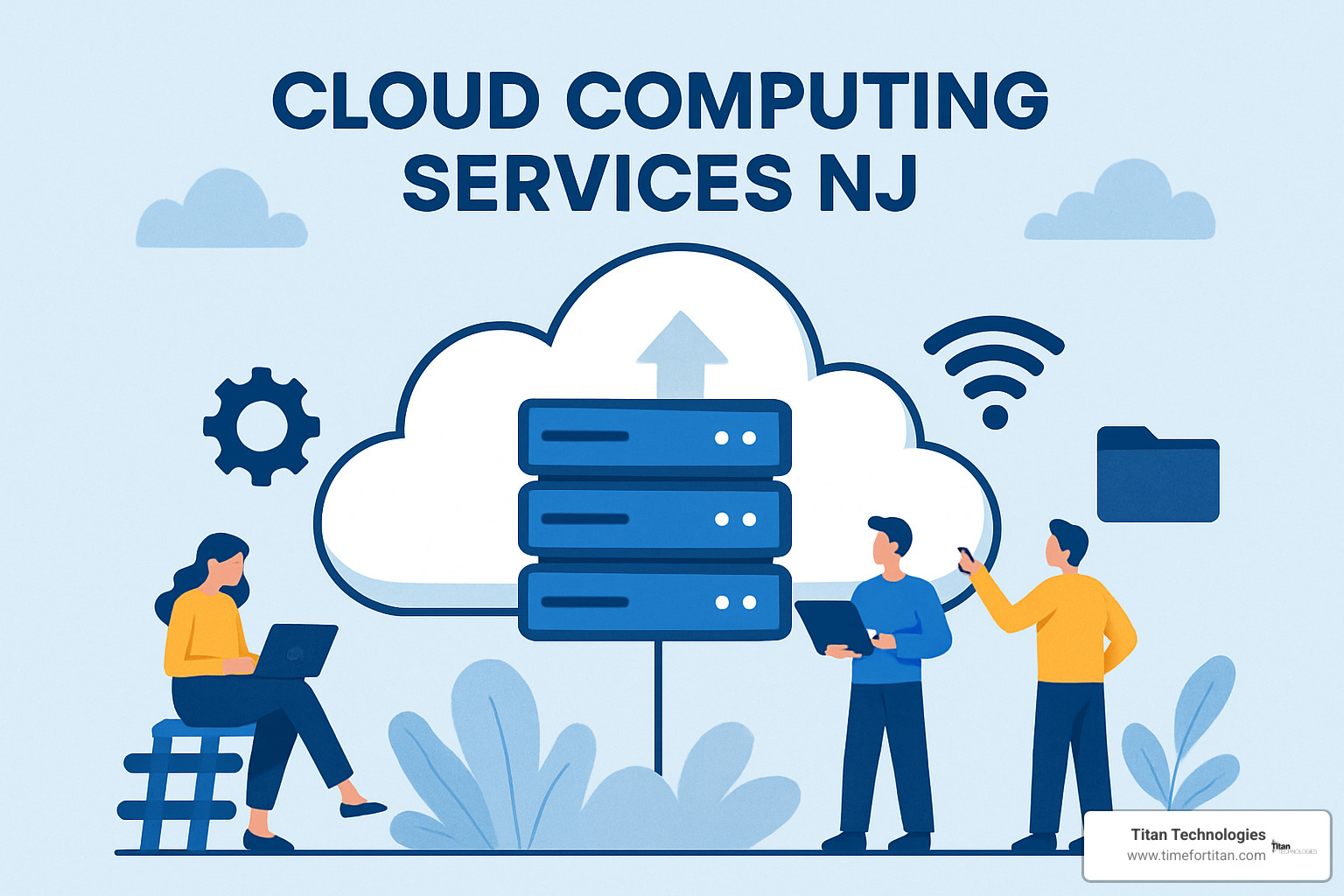Open uping Business Potential with Cloud Computing
Cloud computing services NJ businesses rely on deliver computing resources over the internet instead of through on-premises hardware. If you’re searching for cloud solutions in New Jersey, here’s what you need to know:
- Local NJ providers offer customized cloud services with regional support
- Three primary service models: SaaS, IaaS, and PaaS to match your needs
- Cost savings of up to 30% compared to maintaining on-premises servers
- 24/7 access to your data and applications from anywhere
- Improved security with automated backups and disaster recovery
The business landscape in New Jersey is evolving rapidly, and cloud computing has become the backbone of this change. From the busy financial centers in Jersey City to manufacturing hubs in Newark, organizations are moving their IT infrastructure to the cloud to gain competitive advantages.
“The Cloud offers you the chance to reduce capital investments by employing a cost-efficient, non-physical entity that enables employees to access and work on business files outside the office,” explains one New Jersey cloud services provider.
For New Jersey businesses, cloud computing eliminates the need for expensive on-site servers and constant hardware upgrades. Instead, you can access powerful computing resources on demand, scaling up or down as your business needs change. This flexibility is particularly valuable in today’s hybrid work environment, where employees need secure access to company resources from multiple locations.
Local NJ cloud providers understand the unique challenges faced by businesses in the Garden State, including regulatory compliance requirements for industries like healthcare, finance, and retail. They offer custom solutions that address these specific needs while providing the responsive support that only a local provider can deliver.
Whether you’re a small business in Princeton looking to modernize your IT infrastructure or a growing enterprise in Trenton seeking more scalable solutions, cloud computing services in New Jersey can help you achieve greater efficiency, security, and business continuity.
Simple guide to cloud computing services nj:
– cloud based services new jersey
– cloud hosting new jersey
Cloud Computing Services NJ: What They Are & How They Work
Have you ever flipped a light switch without thinking about power plants? Cloud computing services NJ work in a similar way – delivering powerful technology resources without you needing to maintain complex hardware. Instead of housing servers in your office closet, you’re tapping into computing power delivered over the internet, whenever and however you need it.
“Cloud computing delivers databases, networking, and storage over the internet rather than on-site data centers,” as one New Jersey IT consultant puts it. “This shift fundamentally changes how businesses approach their technology needs.”
What makes this possible is virtualization technology – a bit of digital magic that allows multiple virtual computers to share a single physical server. This approach maximizes resources and dramatically cuts down on hardware needs. For New Jersey businesses, this is even better thanks to edge data centers strategically placed throughout the Northeast corridor, giving you faster access with minimal delays.
How the Cloud Delivers Value
The real power of cloud computing services NJ comes from four key infrastructure elements working together:
Powerful servers process your data and run your applications, while scalable storage systems keep your information safe and accessible. High-speed networking connects everything together, and the robust internet backbone ensures you can reach your cloud resources reliably from anywhere.
For businesses in busy areas like Edison, Elizabeth, and Newark, this translates to exceptional performance. New Jersey’s position as a connectivity hub means your cloud applications stay responsive even during your busiest periods.
As one industry expert notes, “Many IT vendors are jumping on the cloud bandwagon, but for New Jersey businesses, our region’s exceptional connectivity infrastructure gives us a distinct advantage.”
Core Service Models Explained
When exploring cloud computing services NJ, you’ll encounter several service flavors, each offering different levels of control and management:
Software as a Service (SaaS) is like moving into a fully-furnished apartment. Everything’s ready to use – just log in through your web browser to access applications like Microsoft 365 or Salesforce. It’s the simplest entry point to cloud adoption.
Infrastructure as a Service (IaaS) is more like renting the building but bringing your own furniture. You get virtualized computing resources (through providers like AWS or Azure) that you configure to your needs.
Platform as a Service (PaaS) provides a complete development environment where you can build and deploy applications without worrying about the underlying infrastructure – perfect for New Jersey’s growing tech community.
Function as a Service (FaaS) takes a minimalist approach where your code only runs (and you only pay) when needed. Think of it as having utilities that only charge you when you’re actually using them.
Containerization neatly packages applications with everything they need to run consistently anywhere – like shipping your software in perfectly organized boxes that work the same way regardless of their destination.
As one local cloud expert explains: “IaaS gives you the virtual machines and networks without physical hardware headaches. PaaS takes it further by removing concerns about operating systems and platform complexities, providing a cloud-based development environment where you can focus on creating rather than maintaining.”
Cloud Computing Services NJ Use Cases
The beauty of cloud computing services NJ is how they fit nearly every industry across the Garden State. Here’s how local businesses are putting the cloud to work:
Remote teams in commuter-heavy areas like New Brunswick and Woodbridge access company resources securely from anywhere, making hybrid work models not just possible but productive.
Knowledge workers in Princeton’s research sector collaborate in real-time through cloud platforms, sharing insights and making progress regardless of physical location.
Healthcare providers in Trenton maintain strict HIPAA compliance while improving operations. As one administrator shared, “Cloud solutions help us maintain compliance while actually improving our operational efficiency.”
Manufacturing firms in Lakewood stay resilient through unpredictable weather. “Moving our ERP system to the cloud allowed us to maintain operations even when our facility was temporarily closed due to weather events,” reported one local manufacturer.
When coastal flooding or winter storms threaten, cloud-based disaster recovery ensures business continuity. Your data remains safe and accessible even when your physical office isn’t.
At Titan Technologies, we’ve helped countless Central New Jersey businesses transform their operations through thoughtfully planned cloud migrations, delivering the right mix of performance, security, and value for each unique situation.
Benefits & Industry Impact Across the Garden State
When we talk about cloud computing services NJ, we’re really talking about change. Across the Garden State, businesses of all sizes are finding how cloud technology isn’t just changing their IT departments—it’s reshaping their entire operations.
The financial impact is immediate and substantial. By moving to the cloud, New Jersey businesses typically reduce their IT costs by 20-30%. This isn’t just consultant talk—we’ve seen it with our clients. One small manufacturing firm in Middlesex County told us, “We cut our IT budget by a quarter while actually improving our capabilities.”
But the real beauty of cloud computing services NJ is the flexibility it provides. Need to scale up quickly during your busy season? No problem. A boutique retailer in Red Bank doubled their online capacity during holiday shopping season without purchasing a single server. When January came, they scaled back down just as easily, paying only for what they needed.
Reliability is another game-changer. While traditional systems might offer 99% uptime (which still means nearly 90 hours of downtime per year!), cloud providers typically guarantee 99.99% availability. That tiny difference means your systems stay running when your customers and employees need them most.
When disaster strikes—and in New Jersey, we’ve seen our share of hurricanes and nor’easters—cloud-based systems prove their worth. A Matawan business owner shared with us, “Our cloud backup was the only thing that saved us when ransomware hit our local systems. We were back up and running in hours instead of days or weeks.”
Different industries across New Jersey are finding unique ways to leverage cloud technology:
In healthcare, we’ve seen remarkable changes. A Newark medical practice maintained complete system uptime during Hurricane Sandy thanks to their cloud-based electronic medical records. Doctors could access patient information from anywhere with internet access, ensuring continuity of care even during a crisis.
The financial services sector in Jersey City and beyond has acceptd cloud computing for its improved security and analytical capabilities. “Our financial clients sleep better at night knowing their data has enterprise-grade protection without enterprise-grade complexity,” says our cloud specialist at Titan Technologies.
Manufacturing facilities from Elizabeth to Lakewood are using cloud platforms to monitor equipment in real-time, predict maintenance needs, and optimize supply chains. One Elizabeth-based manufacturer improved their operational efficiency by 15% after moving their enterprise resource planning to the cloud—a change that directly improved their bottom line.
Perhaps most heartening is seeing how small and medium businesses throughout New Jersey gain access to technology that was once the exclusive domain of large corporations. “The cloud has leveled the playing field,” explains our solutions architect. “A family business in Freehold can now use the same caliber of tools as a Fortune 500 company.”
For a deeper dive into how cloud solutions are changing New Jersey businesses, check out our comprehensive guide on Cloud-Based Services New Jersey.
Dollars and Sense: The ROI Equation
Let’s talk money—because that’s what ultimately drives business decisions about cloud computing services NJ.
The financial advantage starts with how you pay for IT. Cloud computing shifts spending from large, upfront investments (capital expenditures) to predictable monthly expenses (operational expenditures). This fundamental change improves cash flow and reduces financial risk, especially for growing businesses.
A Princeton technology firm told us they recovered 20 hours per week of IT staff time after moving to the cloud. Think about that—half of a full-time position suddenly freed up for more strategic work. Their IT director noted, “Instead of babysitting servers, our team now focuses on projects that actually move our business forward.”
This staff redeployment benefit appears consistently across industries. “Our IT team has transformed from firefighters to innovators,” reported a Trenton retailer. “They’re now working on customer experience improvements instead of just keeping the lights on.”
The ROI picture becomes even clearer when you consider the less obvious benefits:
Products and services reach the market faster with cloud infrastructure, meaning quicker revenue generation. Employees report higher satisfaction when they have reliable, flexible tools that allow them to work effectively from anywhere. Customers experience fewer disruptions and more consistent service. And perhaps most importantly, the risk of catastrophic data loss or extended business disruption drops dramatically.
Here at Titan Technologies, we help our Central New Jersey clients develop comprehensive ROI analyses that capture both immediate savings and long-term strategic advantages. The numbers almost always tell a compelling story.
Real-World Success Stories in NJ
Sometimes the best way to understand the impact of cloud computing services NJ is through the experiences of local businesses just like yours.
A medical practice in New Brunswick switched to cloud-based electronic medical records and experienced an unexpected benefit during a severe power outage. While neighboring businesses were forced to close, their doctors continued seeing patients using laptops and cellular connections. “We had full access to all patient records despite our main office being completely dark,” the practice manager told us. “Office 365 migration was crucial for this kind of continuity, especially during the pandemic when our physical location was sometimes inaccessible.”
An online retailer based in Edison had struggled for years with traffic spikes during promotions. Their on-premises servers would slow to a crawl or crash entirely during peak periods, costing them sales and damaging their reputation. After migrating to a cloud platform, they handled a Black Friday traffic surge of 500% without breaking a sweat. Their CTO put it perfectly: “The scalability meant we could capture every sale during peak periods without investing in expensive servers that would sit idle most of the year.”
When the pandemic forced a sudden shift to remote learning, a Princeton educational institution leveraged cloud-based collaboration tools to create effective hybrid classrooms overnight. What could have been an educational disaster became an opportunity for modernization. “Our cloud migration enabled us to pivot quickly when in-person instruction became impossible,” the IT director explained. As an added bonus, they reduced their IT infrastructure costs by 25%.
Perhaps most impressive was a Newark manufacturing firm that implemented cloud-based IoT monitoring for their production equipment. The system detected an impending failure in a critical component before any human could have noticed the problem. This early warning allowed for scheduled maintenance instead of an emergency shutdown—saving the company $50,000 in lost production and overtime costs.
These aren’t just success stories—they’re examples of New Jersey businesses using cloud computing services NJ to become more resilient, more responsive, and ultimately more successful in their markets.
Deployment & Security: Building the Right Cloud Strategy
When it comes to cloud computing services NJ, choosing the right deployment model isn’t just a technical decision—it’s a business strategy that affects everything from your daily operations to your long-term growth. Let’s break down your options in plain English.
Think of the public cloud as renting an apartment in a well-maintained building. Services like AWS, Microsoft Azure, and Google Cloud give you access to top-notch infrastructure without owning it. You’ll share resources with other “tenants,” but good fences make good neighbors. This option gives you tremendous bang for your buck and the ability to scale quickly, though some businesses in highly regulated industries might have concerns about data separation.
A private cloud is more like owning your own home—it’s exclusively yours. While it costs more than the public cloud option, you get complete control over your environment. For New Jersey businesses handling sensitive financial data or protected health information, this extra control can be worth every penny.
The hybrid cloud approach? It’s like having a vacation home in addition to your primary residence. You keep your most sensitive operations in your private cloud while taking advantage of public cloud resources for less sensitive needs. I recently spoke with a financial services firm in Elizabeth that keeps all customer financial data in their private cloud while hosting their marketing website on public cloud servers—smart thinking!
Many larger enterprises in New Jersey are exploring multi-cloud strategies, essentially shopping at different stores to get the best deals and features. This approach helps avoid vendor lock-in and lets you optimize each workload with the provider best suited for it.
Security in the cloud isn’t optional—it’s essential. The good news? Cloud security has come a long way. Best practices now include:
- Zero-Trust Architecture that verifies every user and device, no matter where they’re connecting from
- Encryption that protects your data whether it’s moving or sitting still
- Multi-Factor Authentication requiring multiple verification methods (something you know, something you have)
- SOC2 Compliance ensuring your provider meets industry security standards
“Many people don’t realize that cloud providers actually distribute resources across multiple data centers for redundancy,” our security specialist at Titan Technologies often tells clients. “This approach typically provides better security than what most businesses can achieve with on-premises solutions.”
Want to dive deeper into protecting your valuable data? Check out our comprehensive guide on Data Protection Cloud-Based Services.
Selecting a Provider Checklist
Finding the right partner for cloud computing services NJ is a bit like dating—you need to make sure you’re compatible before making a commitment. Here’s what to look for:
First, examine their Service Level Agreements (SLAs). A good provider should offer at least 99.9% uptime guarantees—that’s less than 9 hours of downtime per year. And if they fail to deliver, there should be clear compensation.
There’s something reassuring about local support. When your systems are down, knowing that help is just a short drive away from Edison, Newark, or Trenton can make all the difference. One of our clients once told me, “I sleep better knowing I can meet my IT team face-to-face if needed.”
Your provider should speak your industry’s language, especially when it comes to compliance expertise. Whether you’re dealing with HIPAA in healthcare, FINRA in financial services, or other regulatory frameworks, your cloud partner should steer these waters confidently.
When (not if) disaster strikes, you’ll want robust disaster recovery capabilities. According to The Channel Company research on MSP rankings, how providers handle worst-case scenarios separates the best from the rest.
Don’t be shy about checking technical expertise and asking for references from similar New Jersey businesses. A logistics company in Woodbridge recently shared with me: “We chose our provider because they understood our specific industry needs—and they could be on-site within an hour if something went sideways.”
At Titan Technologies, we take pride in meeting all these criteria for our clients across Central New Jersey, with local teams ready to provide hands-on support whenever you need us.
Cloud Computing Services NJ Migration Roadmap
Moving to the cloud isn’t something you do overnight—it’s a journey. Here’s the roadmap we typically recommend:
During the Assessment Phase, we help you take stock of what you have. Think of it as cleaning out your garage before moving—you need to know what you’re working with. We’ll inventory your applications, map dependencies between systems, evaluate compliance requirements, and define what success looks like for your business.
The Planning Phase is where strategy comes in. We’ll help you select the right cloud model for each workload, design a security architecture that protects your business, develop testing procedures to ensure everything works as expected, and create training plans so your team can hit the ground running.
Before going all-in, we recommend a Pilot Implementation with non-critical applications. This gives you a chance to test the waters, gather feedback from users, and refine processes before moving your mission-critical systems.
When it’s time for Full Migration, we execute a phased approach to minimize disruption. We’ll implement monitoring tools, provide user training, and help you decommission legacy infrastructure when it’s safe to do so.
The journey doesn’t end at migration—the Optimization Phase is where the real benefits kick in. We’ll help you fine-tune resource allocation, implement cost management tools, improve security measures, and explore advanced cloud capabilities that can give your business a competitive edge.
A manufacturing company in Freehold followed this exact roadmap when moving their operations to the cloud. Their IT director told me, “The assessment phase was critical—it helped us identify which workloads were cloud-ready and which needed some work before migration. Without that insight, we would have stumbled right out of the gate.”
At Titan Technologies, we walk alongside our clients through each phase of this roadmap. Our goal isn’t just a successful migration—it’s setting your business up for long-term success in the cloud with minimal disruption along the way.
Frequently Asked Questions about Cloud Computing Services NJ
What steps are involved in migrating my New Jersey business to the cloud?
Moving to the cloud isn’t something that happens overnight. When businesses adopt cloud computing services NJ, they typically follow a thoughtful journey that unfolds in stages:
First comes the findy and assessment phase, where we take a good look at what you already have. We’ll examine your current systems, applications, and data to understand what’s ready for the cloud and where challenges might pop up. Think of it as getting a complete physical before starting a new fitness regimen.
Next, we develop a strategy custom specifically to your business needs. This roadmap outlines which workloads to move first, which cloud model makes the most sense for each application, and how we’ll handle the transition with minimal disruption.
Before any actual migration happens, there’s important preparation work. We set up your new cloud environments, establish security protocols (because protection is paramount!), and make sure your team knows how to steer the new systems. Nobody likes being thrown into the deep end without swimming lessons first.
When it’s time for the actual migration, we take a phased approach. We typically start with non-critical applications to work out any kinks before moving your mission-critical systems. This careful sequencing helps ensure business continuity throughout the process.
One of our financial clients in Red Bank put it well: “Our cloud migration took about three months from assessment to completion, with each phase carefully managed to ensure we maintained compliance throughout the process.”
The journey doesn’t end once everything’s in the cloud. The final phase is ongoing optimization, where we fine-tune your environment to maximize performance and cost-efficiency. Cloud environments should evolve as your business does.
How do public, private, and hybrid clouds differ in terms of security and cost?
Choosing between cloud models is a bit like choosing between renting an apartment, buying a house, or having a vacation home in addition to your primary residence. Each option has different implications for both your wallet and your peace of mind.
Public cloud environments are like well-managed apartment buildings. The security is professionally handled, but you’re sharing some resources with others. The cost barrier to entry is much lower—no massive down payment required—and you pay for what you use on a monthly basis. The economies of scale mean overall costs are typically lower than maintaining your own infrastructure.
This model works beautifully for companies with fluctuating workloads or limited IT staff. A seasonal business in Cape May, for instance, can scale up during summer months and scale down during quieter periods without investing in year-round capacity.
Private cloud gives you your own dedicated space—similar to owning a house with a security system you’ve customized to your exact specifications. You get the highest level of control and customization, which is particularly valuable when dealing with sensitive data or strict compliance requirements.
The trade-off? Higher initial investment and the need for more internal expertise. It’s like the difference between apartment maintenance (included in your rent) versus being responsible for all home repairs yourself.
Hybrid cloud offers the best of both worlds—keeping your most sensitive operations in a private environment while leveraging public cloud for less critical workloads. It’s like having your primary residence plus a vacation property, using each for different purposes.
“Hybrid cloud is often the most realistic solution for balancing cost and performance,” notes our cloud architect at Titan Technologies. “It gives New Jersey businesses the flexibility to optimize both security and expenses.”
What questions should I ask a potential cloud services provider in NJ?
Finding the right partner for your cloud computing services NJ journey is crucial. Here are some conversation starters that will help you separate the truly qualified providers from those who might not be the best fit:
Ask about their local presence: “Do you have support teams right here in New Jersey? If we have an emergency, how quickly can someone be on-site?” A provider with local roots understands the unique business environment in the Garden State.
Dig into their experience with businesses like yours: “Have you worked with companies in our industry before? Can you share some success stories from clients similar to us?” Industry-specific knowledge can make a world of difference in your cloud implementation.
Don’t shy away from tough security questions: “How do you address the specific compliance requirements for our industry? What certifications do you maintain?” A provider should be transparent about their security practices and proud of their compliance credentials.
Clarify service level expectations: “What uptime guarantees do you provide? How do you make things right if those guarantees aren’t met?” The answer reveals how confident they are in their infrastructure and how they handle accountability.
A healthcare provider in Matawan shared this wisdom: “Ask for specific examples of how they’ve helped similar organizations in New Jersey. Their understanding of local business conditions and regulations was crucial for our successful implementation.”
Also explore their migration approach, disaster recovery procedures, and what happens if you ever need to change providers. A quality cloud partner won’t lock you in with excessive data export fees or proprietary formats that make transitions difficult.
At Titan Technologies, we welcome these questions because they lead to better partnerships. Our extensive experience serving businesses throughout Central New Jersey has prepared us to provide thoughtful, transparent answers custom to your specific situation.
Conclusion
The journey to cloud computing services NJ isn’t just about changing where your data lives—it’s about changing how your entire business operates. For companies across the Garden State, cloud adoption has become less about keeping up with technology trends and more about gaining a genuine competitive edge.
When New Jersey businesses accept the cloud, something remarkable happens. Technology shifts from being that necessary expense you grudgingly pay each month to becoming a powerful engine that drives innovation and growth. Whether you’re running a busy medical practice in Newark, a manufacturing operation in Elizabeth, or a financial services firm in Princeton, the cloud opens doors to capabilities that were once available only to enterprises with massive IT budgets.
What makes cloud computing so powerful for local businesses is its remarkable flexibility. Your cloud environment can be as unique as your business itself—custom to your specific industry requirements, compliance needs, and growth objectives.
At Titan Technologies, we’ve guided countless New Jersey organizations through successful cloud changes. What sets us apart isn’t just our technical expertise (though we certainly have plenty of that). It’s our deep understanding of the local business landscape and the unique challenges faced by companies in our region.
When you partner with us, you’re working with a team that lives and works right here in Central New Jersey. We’re your neighbors—with local support teams ready to help across Edison, Elizabeth, Lakewood, Newark, Trenton, Princeton, New Brunswick, Matawan, Woodbridge, Freehold, and Red Bank. That means when you need assistance, you get real people who understand your business, not an anonymous voice from halfway across the country.
Cloud computing services NJ continue to evolve at a remarkable pace. New capabilities emerge almost daily, creating even more opportunities for businesses to innovate and grow. By partnering with Titan Technologies, you gain not just implementation expertise but a trusted advisor who helps you steer this evolving landscape, ensuring your cloud environment continues delivering maximum value as technologies advance.
The cloud isn’t just changing how we store and access data—it’s fundamentally reshaping what’s possible for New Jersey businesses. It’s enabling greater resilience against disruptions, fostering innovation, and creating more agile organizations that can respond quickly to changing market conditions.
Ready to explore how cloud computing can transform your New Jersey business? Visit our Services & Solutions: Cloud Services page or reach out to our team to schedule a conversation. Together, we’ll build a cloud strategy that positions your business for lasting success in our increasingly digital world—with the local support and personal touch that only Titan Technologies can provide.







